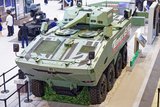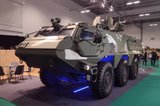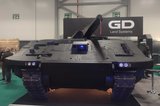Canadian team researches add-on armour
NSERC is funding research into ceramic add-on vehicle armour. (Photo: NP Aerospace)
NP Aerospace is providing engineering expertise and resources for a programme funded by the Natural Sciences and Engineering Research Council of Canada to research and develop new Canadian-made ceramic add-on vehicle armour.
The five-year, C$3.2 million ($2.57 million) initiative also involves three universities (University of Alberta, University of British Columbia and York University), Defence Research and Development Canada and General Dynamics Land Systems - Canada.
The programme will introduce new modelling and simulation technologies to the development and testing of protection against medium-calibre armour piercing fin stabilised discarding sabot ammunition, NP Aerospace noted in a 19 January statement.
Empirical data generated by the programme should underpin future developments and will increase sustainability by replacing a proportion of live testing with simulated testing.
This in turn ‘will reduce the time required to develop and field future armoured vehicles’, NP Aerospace added.
Dr James Hogan of the University of Alberta, academic lead in the programme, said: ‘Armour modelling and simulation has numerous advantages. It allows us to correlate live ballistic impact with simulated testing and to make more informed design decisions using extensive trend-based data.’
More from Land Warfare
-
![US DoD task force’s DroneHunter acquisition lays groundwork for Replicator 2 CUAS strategy]()
US DoD task force’s DroneHunter acquisition lays groundwork for Replicator 2 CUAS strategy
As the US Department of Defense looks to counter the growing threat of uncrewed aerial systems to improve homeland security, the DroneHunter acquisition could point to future commercial innovation.
-
![Norway opts for Hanwha’s Chunmoo for long-range fires under $2 billion deal]()
Norway opts for Hanwha’s Chunmoo for long-range fires under $2 billion deal
The selection of Hanwha’s K239 Chunmoo long-range precision fires system, with a contract expected to be signed on 30 January, makes Norway the second European country to choose the system. It is expected an operational system will be in service within four years.
-
![Land forces review: Tanks, trucks and IFVs dominate but woes remain for Ajax]()
Land forces review: Tanks, trucks and IFVs dominate but woes remain for Ajax
This year has begun with main battle tanks taking the lead while orders for large logistics and support vehicles continued from last year. Additionally, two of the British Army’s most significant contracted vehicle programmes, Ajax reconnaissance vehicle and Challenger 3 tank, continued to make news in January.























